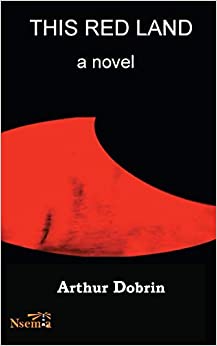Review — THIS RED LAND by Arthur Dobrin (Kenya)
 This Red Land
This Red Land
By Arthur Dobrin (Kenya 1965-67)
Nsemia Inc. Publishers
340 pages
January 2018
$9. 99 (Kindle); $12.40 (Paperback)
Reviewed by Stephen Foehr (Ethiopia 1965-67)
•
A body falls from the sky and splats on a London street. The Kenyan passport associated with the dead man is an amateur fake. The name in the passport cannot be found in any Kenyan government database.
A young boy living in a Kenyan market town drops out of school to attend the University of the Street. He joins tribal conflicts between the Maasi and the Kisii.
A Black family in Brooklyn tries to improve their situation and smacks into the wall of housing discrimination.
A young White girl, bright, ambitious, big plans for life, a firebrand for equality learned on the knee her fellow-traveler father is slapped down by the reality of capitalistic USA.
A young Kenyan girl, bright, ambitious, big plans for life riding a strong independent streak earns her advanced education degree, becomes a teacher and folklore researcher, and is entangled in the web of societal and cultural constraints.
A promising start to Arthur Dobrin’s novel, The Red Land. Dobrin’s fiction is grounded in realities, as attested by the extensive appendix of notes. A body did fall out of the wheel well of Kenya Airway Flight KQ 100 from Nairobi to London, landing in a back garden in Clapham, with no identification but Kenyan currency in a rucksack. Dobrin’s knowledge of Kenya, the tensions in the society, the colonial history, and tribal conflicts, were observed firsthand during his two years as a Peace Corps volunteer in the country. The well-published author’s research is reliable; he has been a Professor Emeritus, teaching at universities in numerous countries.
The novel’s tapestry is woven by the threads of Junius, son of the Brooklyn Black family, Lena, white, weaned on the indignities of economic and social injustices, and Sarah Kwamboka, namesake of Moraa Kwamboka, a reputed prophet, healer, and, according to one story, the killer a British colonial overlord by throwing a spear into his back. The theme is the deleterious legacy of colonialism (the physical mental, and emotional attitude), slavery (ditto), cultural and institutional discrimination (ditto)—and yet individuals find an overarching commonality in human nature.
The reader is taken on a cultural and historical tour de force through Kenyan tribal conflicts that influence the society (marriage customs, women place in society, witchcraft beliefs) long after the British lowered their flag and retreated to their island home. A parallel journey through the United States society and culture encompasses the 1950s Communist scare tactics, Bay of Pigs, Kennedy assassination, Hippies, Yippies, Democrat’s Chicago battle convention, Hare Krishna, commune ideology, breaking dancing and rap, the whole panoply of the American college.
Dobrin’s point, as articulated by the folklore researcher Sarah Kwamboka: There are two versions of each tale, the original, or authentic, the wisdom of the history and cultural values, passed on orally, usually from an elder, which Kwamboka records in the Gusii language, and the second version, the re-writing of the history and mores recorded in English. This applies universally throughout history in the constant struggle between the winners and the victims. Lena, Junius, and Sarah Kwamboka carry the message in their bottle of the personal life of loves and disappointments, and achievements acted out on the greater stage.
The globetrotting story takes Sarah Kwamboka to London, then to teach at New York University, where she meets Lena. Junius, a successful music producer, lives with Lena and pays her university tuition, and gets her pregnant. He wants to take her to Japan, where he does business. The story sways back to Kenya, where Sarah Kwamboka had returned to found a school. The theme stays constant—racism, injustice, economic inequality, preening authority, protests by the underdogs.
And that young Kenya boy who dropped out of school at the beginning reappears in the epilogue as a policeman, repulsed by the corruption in daily Kenyan life. He is sent from Nairobi to the countryside to investigate the murder Sarah Kwamboka. He becomes the target of assassination and flees Kenya in fear of his life as a stowaway in the wheel well of a Kenya Airway flight to London.
•
Stephen Foehr (Ethiopia 1965-67) is the author of numerous nonfiction and fiction books. His latest novel, Warrior Love, Silas Loves Lili Weirdly Lili Loves Silas, about corruption, was released in July 2021. His next novel, BIX (Because I eXist), an exploration of the choices to react to and survive an authoritarian government, will be released in Spring 2022.
No comments yet.
Add your comment